Once Upon A Time in the Steppes - Part One
Read Part Two // Read Part Three // Read Part Four
It has been two years since I organized and led a Habitat for Humanity volunteer trip. What was once regular practice — one of the dominant themes of my college social life, actually — has been relegated to anecdotes and memories during my two years expatriation in Japan. Last year's trip to Bangladesh offered a brief building fix, but then as participant rather than leader; it was enjoyable in its way, but also not what I had been used to. I doubt anyone would've predicted it during my quiet high schooler days, but three years in a position of responsibility with the Boston University Habitat organization definitely has changed me — for all the stress involved, I'd still rather be Fearlessly Leading. The unpredicted complications in the run-up to our departure were many, but "then I spent two hours wading through the Japanese post office bureaucracy" or "the correspondent bank in New York didn't have enough account information to forward our $2000 of tour money to the bank in Mongolia" doesn't make for a very thrilling travel narrative... so I'm going to begin at our date of departure and simply note that, for me anyhow, the adventure had already begun a good while back. I had booked (and re-booked) tickets, sent long exhaustive e-mails, collected donations, corresponded with our hosts, fought with my Board of Education, and chipped in about $5000 of my own money in the hope that I would eventually get it back (I did, eventually). Now it was time to actually make it happen.
We left from Fukuoka International Airport on the evening of Friday the 27th; we had originally planned to leave on a flight the following Saturday morning, but that waitlist never budged. Golden Week, four national holidays in the span of seven days, is probably the busiest travel season in Japan outside of maybe New Year's, and apparently a lot of people were heading to Seoul to stock up on kimchi and Yon-sama t-shirts. Luckily for the eleven of us, we were able to get onto a flight late enough in the evening that no-one would have to take off work Friday in order to make it to the airport. I caught the bus with Ms. Riddarfjarden and Erin and got to Fukuoka around 6:30; everyone else was there ready to go, so I handed out passports and tickets and we checked our bags through to Ulan Bator. The airport was pretty empty that evening so I had figured we would have no problem; but after delays changing money, having to repack a bag with all of our liquids, and there being only one grumpy guy at the emigration counter, the plane was starting to board by the time we finally got through, hot and tired. We were able to relax on the quick plane ride over, though, and got into Seoul around 10:30 in the evening.
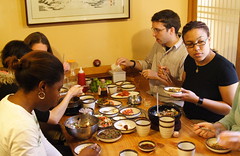 I had booked rooms at the Incheon Guesthouse, and although our initial attempt to call and have them come pick us up failed — nobody spoke English on the other end — we did get help from the airport information services. Two vans showed up not long after, whose drivers did speak English, and they whisked us away to the guesthouse, which like the one I stayed in on my trip to Busan in February, was located in a large apartment tower complex. Even so, it was pretty nice, with a kitchenette and everything — probably meant for longterm stay, I guess.
I had booked rooms at the Incheon Guesthouse, and although our initial attempt to call and have them come pick us up failed — nobody spoke English on the other end — we did get help from the airport information services. Two vans showed up not long after, whose drivers did speak English, and they whisked us away to the guesthouse, which like the one I stayed in on my trip to Busan in February, was located in a large apartment tower complex. Even so, it was pretty nice, with a kitchenette and everything — probably meant for longterm stay, I guess.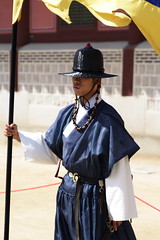 Our flight on to Ulan Bator Saturday wasn't until the evening as well so we had almost a full day to kill in Seoul; we slept in and lounged around until around 11:00ish at which point we dragged ourselves down to check out and see the city. The guesthouse drivers took us back to the airport, where we all checked buses and took one in to Anguk in Seoul, about an hour and a half away — with the plan being that some people would split up but that we would all be meeting back at the airport no later than 6:00 PM. One person split off in Anguk to meet a friend and the rest of us had a delicious Korean-style lunch; Korean food continues to be one of my favorites, especially for eating in groups. After that about half of us split for walk the Insadong street arcade and window shop at art stores, and the other half (with me included) headed to Gyeongbokgung Palace. It's Seoul's largest and grandest, until the Japanese got to it — twice, once in 1592 and then again in the 1890s. The city has crept up around it but it's currently being restored and several of the buildings are still quite impressive; also cool were the "royal guards" stationed at the gates, whose costumes visitors were able to try on. I didn't have time to see the War Memorial Museum (I was apparently the only one who wanted to go) so I'm going to have to come back to Seoul some day and check that out (and go on a DMZ tour).
Our flight on to Ulan Bator Saturday wasn't until the evening as well so we had almost a full day to kill in Seoul; we slept in and lounged around until around 11:00ish at which point we dragged ourselves down to check out and see the city. The guesthouse drivers took us back to the airport, where we all checked buses and took one in to Anguk in Seoul, about an hour and a half away — with the plan being that some people would split up but that we would all be meeting back at the airport no later than 6:00 PM. One person split off in Anguk to meet a friend and the rest of us had a delicious Korean-style lunch; Korean food continues to be one of my favorites, especially for eating in groups. After that about half of us split for walk the Insadong street arcade and window shop at art stores, and the other half (with me included) headed to Gyeongbokgung Palace. It's Seoul's largest and grandest, until the Japanese got to it — twice, once in 1592 and then again in the 1890s. The city has crept up around it but it's currently being restored and several of the buildings are still quite impressive; also cool were the "royal guards" stationed at the gates, whose costumes visitors were able to try on. I didn't have time to see the War Memorial Museum (I was apparently the only one who wanted to go) so I'm going to have to come back to Seoul some day and check that out (and go on a DMZ tour).The two groups met back at around 4 and we caught the bus back to the airport — although the ride was pretty jarring ("he's driving this bus like a taxi" was how Ms. Riddarfjarden described it) we did get there exactly on time, at 6:00. Unfortunately, we then proceeded to have a small panic over the fact that J., who had gone off to meet her friend, was not back yet. After several pages over the airport PA system I finally told the others to head up and start checking in, but not to leave without me and J. — I don't know what would've happened if she hadn't made it back in time, but I was not about to leave anyone behind, so it probably wouldn't have been anything good. She did finally make it there by 7:00, having missed the bus and taken an $80 cab in order to get there about 45 minutes before our plane was to depart. We got through security fast, I dashed into an electronics store to buy a universal plug adaptor, and then onto the plane we went! This was probably the most stressful moment of the trip, and it did introduce a bit of tension in the group, but ultimately luck was with us.
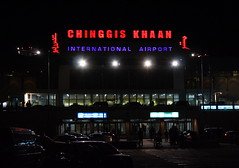
The flight was almost empty so I attempted to nap a little bit, but no luck; we arrived into Ulan Bator at around midnight on Saturday after a three and a half hour flight. Our first taste of Mongolia was pretty bland; the immigration hall was small and the process slow (not helped by the fact that ours closed right as we got to the front). When we did get through our bags were waiting for us, and outside so was Batbold and the rest of the Habitat team, with the van and car that would be our team's transportation for the week and a half we would spend building with the Darkhan Habitat for Humanity affiliate.
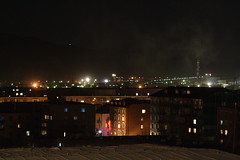 Batbold greeted us with a friendly smile and an accent that (like most Mongolians) was very Russian-sounding to my ears; he mentioned that English has only been a popular language of study since 1992, when Mongolia gave up Soviet-style socialism. We piled into the cars and strapped our bags to the roof to head off into night for our hotel in central Ulan Bator; I sat up front wedged between Batbold and the driver and we chatted through the drive. I attempted to learn a bit of Mongolia and learned that "thank you" is very hard to say (what we eventually learned sounded something like "bar-shlah", and whether that was even close I'm still not sure — a lot of tricky gutturals and blends in Mongolian). I also learned that, incidentally, tomorrow was apparently the first ever emissions-reduction day in Ulan Bator (on account of the bad smog) and maybe we wouldn't be able to drive anywhere? But we'd figure out something. (Last year in Dhaka, oddly enough, there was a similar sort of case, except that in that case it was striking opposition parties blocking the streets.) We did get to our hotel, the Amure, at around midnight, and collapsed into several rooms.
Batbold greeted us with a friendly smile and an accent that (like most Mongolians) was very Russian-sounding to my ears; he mentioned that English has only been a popular language of study since 1992, when Mongolia gave up Soviet-style socialism. We piled into the cars and strapped our bags to the roof to head off into night for our hotel in central Ulan Bator; I sat up front wedged between Batbold and the driver and we chatted through the drive. I attempted to learn a bit of Mongolia and learned that "thank you" is very hard to say (what we eventually learned sounded something like "bar-shlah", and whether that was even close I'm still not sure — a lot of tricky gutturals and blends in Mongolian). I also learned that, incidentally, tomorrow was apparently the first ever emissions-reduction day in Ulan Bator (on account of the bad smog) and maybe we wouldn't be able to drive anywhere? But we'd figure out something. (Last year in Dhaka, oddly enough, there was a similar sort of case, except that in that case it was striking opposition parties blocking the streets.) We did get to our hotel, the Amure, at around midnight, and collapsed into several rooms.The next morning we had breakfast at the hotel (sausages and some sort pancake blobs which were better than that sounds) and then an orientation session with Batbold and Baynaa the Darkhan Affiliate Development Officer (who would be our host and my counterpart in Darkhan) in the hotel. Batbold was funny and did a very good job explaining Habitat, its mission, and its programs in Mongolia, particularly for an audience like ours where most people had not worked with HFH before. More than one wit had remarked to us before we left that "you're going to build houses for nomads?", but the reality is that since the end of socialist control and the resumption of free internal migration within the country after a seventy-year freeze, urbanization has increased rapidly as the population seeks jobs in cities like Ulan Bator and Darkhan. Over half the population lives in the cities now, where unemployment can be as high as 40%, and limited building resources (materials are often imported from China), aging and overcrowded Soviet-era housing, and high loan rates make home ownership very challenging for a lot of Mongolian families. HFH Mongolia has been in operation since 2000, with three Affiliates (building new houses) and another five Program Centers (renovating older houses) throughout the country. To date they've built 575 new houses and renovated 110, with goals for 800 this year. Two of those, we would be helping complete, and our group's donations (over $6000 worth) would go towards the construction of several more.
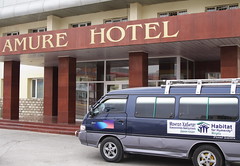 After our orientation we hit the streets of UB — side streets, on account of the aforementioned traffic restrictions, but it didn't turn out to be too much of an inconvenience for us. Ulan Bator was looking very dusty and very post-Communist; lots of drab concrete and industrial decay, but also interspersed with new construction, SUVs on the streets, and some pedestrians in chic European fashion. Unlike poor Bangladesh, Mongolia appears to be a developing country that actually is developing, however unevenly, thanks to the influx of Western assistance post-1992 and the commodities industry boom. We joined the ranks of millionaires after converting all of our team money into tugrug notes (a little over 1000 to the dollar) and used that to go on a short shopping trip at a local grocery store where we stocked up on bottled water. From there we made a side stop at our tour guides' offices to pay for the R&R portion of our trip, which we would be taking for our last three days in-country, and then crammed ourselves into a very tight van for the three and a half hour drive to Darkhan.
After our orientation we hit the streets of UB — side streets, on account of the aforementioned traffic restrictions, but it didn't turn out to be too much of an inconvenience for us. Ulan Bator was looking very dusty and very post-Communist; lots of drab concrete and industrial decay, but also interspersed with new construction, SUVs on the streets, and some pedestrians in chic European fashion. Unlike poor Bangladesh, Mongolia appears to be a developing country that actually is developing, however unevenly, thanks to the influx of Western assistance post-1992 and the commodities industry boom. We joined the ranks of millionaires after converting all of our team money into tugrug notes (a little over 1000 to the dollar) and used that to go on a short shopping trip at a local grocery store where we stocked up on bottled water. From there we made a side stop at our tour guides' offices to pay for the R&R portion of our trip, which we would be taking for our last three days in-country, and then crammed ourselves into a very tight van for the three and a half hour drive to Darkhan.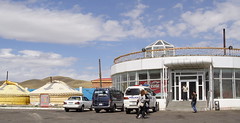 Although the legroom situation didn't get much better, the scenery did — we gradually left behind the dusty pall of UB and came out under the huge blue sky Mongolia is famous for. I've never seen a landscape quite like it before — huge expansive plains and hills stretching out from the potholed highway, dotted every now and then by a ger camp or a herd of cows, horses, or goats. Baynaa later said that, in summer, it all turns lush and green, but with spring only just beginning in Mongolia (we saw a few small patches of snow) the grasses were mostly tan and sparse. We stopped at a highway diner and after discovering the joys of open-pit toilets enjoyed a hearty meal of lamb burger and rice with ketchup... and got to check out the Mongolian high police outfit as well on some of our fellow diners, which is very Red Army-esque: military-style cap, white T-shirt with field jacket, black combat boots. I paid for lunch from the biggest bag of money the little boy next to the register had ever seen, and then we hit the road again.
Although the legroom situation didn't get much better, the scenery did — we gradually left behind the dusty pall of UB and came out under the huge blue sky Mongolia is famous for. I've never seen a landscape quite like it before — huge expansive plains and hills stretching out from the potholed highway, dotted every now and then by a ger camp or a herd of cows, horses, or goats. Baynaa later said that, in summer, it all turns lush and green, but with spring only just beginning in Mongolia (we saw a few small patches of snow) the grasses were mostly tan and sparse. We stopped at a highway diner and after discovering the joys of open-pit toilets enjoyed a hearty meal of lamb burger and rice with ketchup... and got to check out the Mongolian high police outfit as well on some of our fellow diners, which is very Red Army-esque: military-style cap, white T-shirt with field jacket, black combat boots. I paid for lunch from the biggest bag of money the little boy next to the register had ever seen, and then we hit the road again.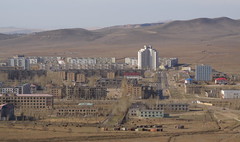 We arrived in Darkhan at around 4:00 and checked into the Urtuuchin Hotel, which would be our home for the next week and a half. As I was one of only two guys on the trip (story of my Habitat career, to be honest) there wasn't much doubt as to who my roomate would be; the rest of us paired off and stowed our bags, then went down to the hotel restaurant to place orders for our dinner that evening before heading out for a tour of the city with Baynaa and "Bob", a member of the Darkhan HFH board, English translator, and teach at the local 800-student Darkhan College, which I gathered is a hospitality university. In the course of placing our orders, we met a Korean couple (the husband of which I believe was there on a mining contract?) who were either a little crazy or a little drunk or possibly both; in any case after we explained what we, a group of 11 young foreigners, happened to be doing here in Darkhan, they insisted on giving us one of every tugrug note (T10 on up through T20,000). The orientation that morning had mentioned our giving gifts to the locals — generally, it's preferred that we do it through the Habitat organization, so as to reduce dependency and potential pressure on future GV teams — but nobody told us what to do if someone was trying to give a gift to us. We eventually established that they didn't want to give us this money (it was worth at least about $35) as a donation but rather a "souvenir" to remember Mongolia by. After several protestations that Darkhan HFH could use this money much more than us — which were emphatically brushed aside — I finally caved in and took the money, which I promptly offered to Baynaa as soon as we got outside. After going back in to talk to the couple some more, he returned and said "this is your problem", which was worth a laugh at that point. So we took the money.
We arrived in Darkhan at around 4:00 and checked into the Urtuuchin Hotel, which would be our home for the next week and a half. As I was one of only two guys on the trip (story of my Habitat career, to be honest) there wasn't much doubt as to who my roomate would be; the rest of us paired off and stowed our bags, then went down to the hotel restaurant to place orders for our dinner that evening before heading out for a tour of the city with Baynaa and "Bob", a member of the Darkhan HFH board, English translator, and teach at the local 800-student Darkhan College, which I gathered is a hospitality university. In the course of placing our orders, we met a Korean couple (the husband of which I believe was there on a mining contract?) who were either a little crazy or a little drunk or possibly both; in any case after we explained what we, a group of 11 young foreigners, happened to be doing here in Darkhan, they insisted on giving us one of every tugrug note (T10 on up through T20,000). The orientation that morning had mentioned our giving gifts to the locals — generally, it's preferred that we do it through the Habitat organization, so as to reduce dependency and potential pressure on future GV teams — but nobody told us what to do if someone was trying to give a gift to us. We eventually established that they didn't want to give us this money (it was worth at least about $35) as a donation but rather a "souvenir" to remember Mongolia by. After several protestations that Darkhan HFH could use this money much more than us — which were emphatically brushed aside — I finally caved in and took the money, which I promptly offered to Baynaa as soon as we got outside. After going back in to talk to the couple some more, he returned and said "this is your problem", which was worth a laugh at that point. So we took the money.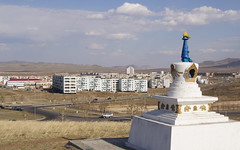 After this little episode we got in the van and car (which were a lot roomier now without the luggage) and took a short tour of the city, visiting a hill topped with a Buddhist stupa monument that overlooked both the old and new sections of town; another hill across the road featured a statue of a rider playing the horse fiddle. Darkhan has only existed since the 1960s, when it was planned and built by the Russians as an industrial town — the name means "blacksmith" in Mongolian. Today the population is around 100,000, and most of the Russians have gone home; a lot of industry has closed down but there is still some left (they pointed out a thermal power plant, sheepskin factory, and a few machine factories on our tour). We went back to the hotel and visited an internet cafe before dinner, which was good. Exhausted, I headed to bed soon after that, and so ended our first full day in Mongolia.
After this little episode we got in the van and car (which were a lot roomier now without the luggage) and took a short tour of the city, visiting a hill topped with a Buddhist stupa monument that overlooked both the old and new sections of town; another hill across the road featured a statue of a rider playing the horse fiddle. Darkhan has only existed since the 1960s, when it was planned and built by the Russians as an industrial town — the name means "blacksmith" in Mongolian. Today the population is around 100,000, and most of the Russians have gone home; a lot of industry has closed down but there is still some left (they pointed out a thermal power plant, sheepskin factory, and a few machine factories on our tour). We went back to the hotel and visited an internet cafe before dinner, which was good. Exhausted, I headed to bed soon after that, and so ended our first full day in Mongolia.In the next part, I'll talk about our first week of work; our visit to an elementary school; and getting stuck in a river in the middle of nowhere. Excitement abounds!



1 comment:
Hello,this is first time to contact with you.I'm a menber of HFH KUIS,which is one of campus chapter of HFH JAPAN. I'll visit Darkhan this Aug so I was googling and surprisingly, I found your website! I'm happy to see HFH's menber's page and nice photoes of Darkhan. So thank you and sorry for my rudeness.
Post a Comment